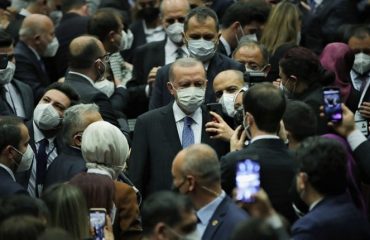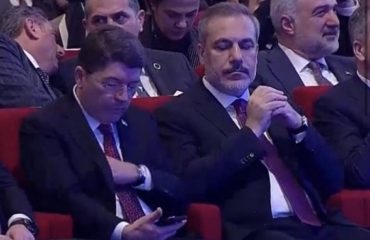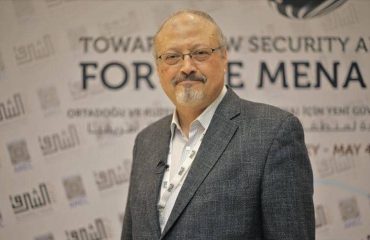Following a key visit of U.S. Senator Lindsey Graham, to Turkey on Jan 18, it is almost clear that the withdrawal of the American troops from Syria may not be immediately as the U.S. President Donald Trump has stated almost a month ago on Dec 24, 2018.
Calling up Trump late on Jan 20, Turkish President Tayyip Erdoğan endorsed the messages he sent via Graham, confirmed his will to cooperate in Syria and said Turkey was ready to take over the security as the American troops withdraw, starting from the disputed town of Manbij.
Graham’s visit was right after a Twit by Trump in which he said Turkish economy would be “devastated” if Turks “hit Kurds” after the withdrawal of American soldiers. That was also condemned by Turkish opposition parties as Foreign Minister Mevlüt Çavuşoğlu said the Turkish people would starve but not bow before such threats. The economy with inflation rate is back in double digits, interest rates more than 20 percent and Turkish lira vulnerable to U.S. dollar moves is perhaps the Achilles heel of President Tayyip Erdoğan’s Justice and Development Party (AK Parti) government, as the country is heading for local elections on March 31. Erdoğan, instead of expressing his fury publicly, opted for diplomacy this time and called up Trump, as an indication of willingness not to antagonize the situation further and to find a middle way.
Graham, who is known to be an opponent of Trump within the Republican Party on a number of matters but national security called up Turkish Ambassador Serdar Kılıç last week and asked for a series of high rank appointments in the Turkish capital Ankara. He got them immediately. On Jan 18, he met President Erdoğan, Foreign Minister Çavuşoğlu, Defense Minister Hulusi Akar and the head of Turkish intelligence MIT, Hakan Fidan; almost a state president’s treat.
Graham is not someone alien to Ankara. Last December he was the one who organized an informal and secretive meeting in the Congress where Fidan briefed a limited number of senators mainly on the murder of Jamal Khashoggi in the General Consulate of Saudi Arabia in Istanbul. Democratic Senator Jeanne Shaheen was among them; the two had been in Turkey for high ranking contacts, including Erdoğan before the release of Pastor Andrew Brunson last year. Graham is closely interested in Turkey’s fight against the outlawed Kurdistan Workers’ Party (PKK), which is designated as terrorist not only by Turkey but also the U.S. and the European Union (EU) countries. The PKK which was clandestinely established with a Marxist-Leninist program in 1978 has been waging an armed campaign against since 1984 with the target of carving out an independent Kurdish state out of the NATO member Turkey as well as Iran, Iraq and Syria which claimed some 50 thousand lives so far. It was Graham back in 2015 who forced Obama’s Secretary of Defense Ashton Carter to admit that the administration was aware of the “organic relation” between the PKK and its de facto Syria branch the Democratic Union Party (PYD) as Ashton was trying to convince the Senate for arms delivery to use its armed wing the People Protection Units (YPG) as foot soldiers against the Islamic State of Iraq and Levant (ISIL) in Syria.
So far the U.S. Central Command (CENTCOM) has armed and trained some 30 thousand YPG militia in north east of Syria despite persistent warnings by its NATO ally Turkey that it would pose a national security threat under the protection of Americans; Turkey has a 911 km porous border with Syria and is currently erecting hundreds kilometers of concrete blocks to seal it. It is ironic to remember that it was the U.S. intelligence CIA which had cooperated with the MIT upon President Bill Clinton’s orders to arrest the PKK’s founding leader Abdullah Öcalan 20 years ago in February 1999.
Therefore it is important when he said in his Jan 19 press conference before leaving Turkey that he acknowledged the problems the U.S. created for Turkey with its cooperation with the YPG, which he described as an “arm of PKK”. That is not a regret that the American soldiers used the YPG as their ground forces against ISIL, which had practical results. But Graham was also saying that General Joseph Dunford, the U.S. Chief of Joint Staff, who met with his Turkish counterpart General Yaşar Güler in Brussels last week in the premises of a NATO meeting, was working on a plan to prevent possible YPG, or PKK attacks from Syria to Turkey when the withdrawal was completed. Ankara would prefer to see a YPG/PKK clear zone along the Syria side of the border.
It is also important that Graham did not used the word “Kurds” this time but named the organization, the YPG and defined it as an arm of the PKK, which he acknowledges as terrorist as well. That is important because Graham only last week was saying in Senate that it would be “crazy” to expect the Turkish army to get into Syria to finish off ISIL because they would shell “Kurds”.
By saying “Kurds” neither Graham, nor Trump had meant for example Iraqi Kurds, now lead by Masoud Barzani who have good relations with Turkey and Kurds. By saying “Kurds” They did neither mean more than half of Kurds living in Turkey and voting for President Erdoğan’s AK Parti and some other opposition parties as well. When they said Kurds they meant YPG as if YPG and its mother organization PKK was representing entire Kurdish population in four neighboring countries; that was not true, that was falling into trap of a fake propaganda.
But it is not only this plan which could delay the withdrawal of the American soldiers from Syria. There are other serious problems.
For example, as soon as Trump announced the withdrawal, the number of ISIL terror attacks started to increase. As soon as the new hit the wires, YPG/PKK started to flirt with Russian forces in Syria; pictures of YPG militia patrolling with Russian special forces near the disputed town of Manbij appeared in media on the same day of Graham’s contacts in Ankara. Despite Erdoğan’s demand from Trump to hand over the security of the town to Turkey-backed local Arab forces, Russia wants the YPG to keep the control as long as they cooperated with Russian-backed Syrian government forces. There was an earlier statement from Moscow, asking the Syrian Kurds to get into contacts with the Bashar al-Assad regime in Damascus; Russia and Iran being the main supports of the Assad regime. On the other hand there is reported decrease in number of Turkish shelling of the YPG positions on the Syrian side of the border since the start of the new phase of diplomacy.
Turkey is the member of the U.S.-led anti-ISIL coalition and also the Astana Process to maintain de-escalation zones in Syria together with Russia and Iran; playing a diplomatic balancing role in the Syria theater. Weakening the Turkish hand could mean letting Russian and Iranian influence in Syria and elsewhere in the Middle East to increase.
Now the eyes are on Trump’s stance after Erdoğan’s call and his possible meeting with Graham.


